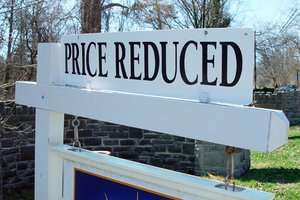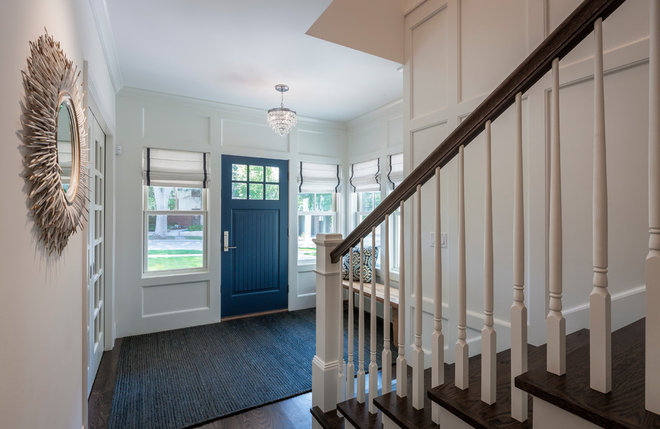Blogger
Information and Tips on all things Real Estate
Mon Oct 20 18:31:00 UTC 2014
Door Decor for Fall
First Impressions: Door Decor for Fall
Make a great first impression for trick-or-treaters and guests this season by decorating your door with festive flair. Incorporate wreaths, pumpkins, and other symbols of the season.
1. Wreaths: Buy or DIY a wreath made of leaves, fruit, and fall flowers. Hang your wreath on the front door to create a colorful, welcoming, and engaging entrance.
2. Pumpkins: Pumpkins are practically the mascots for fall. Aside from a classic wreath, there is no better way to decorate than using pumpkins. Carving or painting pumpkins can be a fun activity for you and your family. Gather together to decorate the pumpkins and place them on your steps. (Don’t forget to roast the seeds for a delicious snack.)
3. Fall flowers: Plant or display fall flowers such as perennial sunflowers and chrysanthemums. They’ll add a colorful and fragrant touch to your doorway.
4. Farm stand baskets: Place a farm stand basket filled with colorful fruit, leaves, and dried corn stalks on your front porch to show your love for fall. If you’re skeptical about leaving perishables such as pumpkins or gourds outside, this is a great alternative. You can use fake fruit and leaves that still give off a natural, autumn look.
5. Spooky elements: Delight neighborhood trick-or-treaters by transforming your door so that it looks like an entrance to a haunted house. Buy fake cobwebs, plastic spiders, witches hats, and other frightening finds.
Get into the fall spirit by adding color, texture, natural elements, and a spooky surprise to your front door. Now just grab a pumpkin spice latte, your favorite cozy sweater, and get started.
Mon Sep 29 16:30:00 UTC 2014
What's Right For You?
Thu Sep 25 19:41:00 UTC 2014
8 Tips for Finding Your New Home
Understand the type of home that suits your personality. Do you prefer a new or existing home? A ranch or a multistory home? If you’re leaning toward a fixer-upper, are you truly handy, or will you need to budget for contractors?
2. Research before you look
List the features you most want in a home and identify which are necessities and which are extras. Identify three to four neighborhoods you’d like to live in based on commute time, schools, recreation, crime, and price. Then hop onto REALTOR.com to get a feel for the homes available in your price range in your favorite neighborhoods. Use the results to prioritize your wants and needs so you can add in and weed out properties from the inventory you’d like to view.
3. Get your finances in order
Generally, lenders say you can afford a home priced two to three times your gross income. Create a budget so you know how much you’re comfortable spending each month on housing. Don’t wait until you’ve found a home and made an offer to investigate financing.
Gather your financial records and meet with a lender to get a prequalification letter spelling out how much you’re eligible to borrow. The lender won’t necessarily consider the extra fees you’ll pay when you purchase or your plans to begin a family or purchase a new car, so shop in a price range you’re comfortable with. Also, presenting an offer contingent on financing will make your bid less attractive to sellers.
4. Set a moving timeline
Do you have blemishes on your credit that will take time to clear up? If you already own, have you sold your current home? If not, you’ll need to factor in the time needed to sell. If you rent, when is your lease up? Do you expect interest rates to jump anytime soon? All these factors will affect your buying, closing, and moving timelines.
5. Think long term
Your future plans may dictate the type of home you’ll buy. Are you looking for a starter house with plans to move up in a few years, or do you hope to stay in the home for five to 10 years? With a starter, you may need to adjust your expectations. If you plan to nest, be sure your priority list helps you identify a home you’ll still love years from now.
6. Work with a REALTOR®
Ask people you trust for referrals to a real estate professional they trust. Interview agents to determine which have expertise in the neighborhoods and type of homes you’re interested in. Because home buying triggers many emotions, consider whether an agent’s style meshes with your personality.
Also ask if the agent specializes in buyer representation. Unlike listing agents, whose first duty is to the seller, buyers’ reps work only for you even though they’re typically paid by the seller. Finally, check whether agents are REALTORS®, which means they’re members of the NATIONAL ASSOCIATION OF REALTORS®. NAR has been a champion of home ownership rights for more than a century.
7. Be realistic
It’s OK to be picky about the home and neighborhood you want, but don’t be close-minded, unrealistic, or blinded by minor imperfections. If you insist on living in a cul-de-sac, you may miss out on great homes on streets that are just as quiet and secluded.
On the flip side, don’t be so swayed by a “wow” feature that you forget about other issues—like noise levels—that can have a big impact on your quality of life. Use your priority list to evaluate each property, remembering there’s no such thing as the perfect home.
8. Limit the opinions you solicit
It’s natural to seek reassurance when making a big financial decision. But you know that saying about too many cooks in the kitchen. If you need a second opinion, select one or two people. But remain true to your list of wants and needs so the final decision is based on criteria you’ve identified as important.
G.M. Filisko is an attorney and award-winning writer who has found happiness in a brownstone in a historic Chicago neighborhood. A frequent contributor to many national publications including Bankrate.com, REALTOR® Magazine, and the American Bar Association Journal, she specializes in real estate, business, personal finance, and legal topics.
Mon Sep 22 19:32:00 UTC 2014
Keep Your Home Purchase on Track
You've found your dream home. Make sure missteps don’t prevent a successful closing.
1. Be truthful on your mortgage application
You may think fudging your income a little or omitting debts when applying for a mortgage will go unnoticed. Not true. Lenders have become more diligent in verifying information on mortgage applications. If you fib, expect to be found out and denied the loan you need to fund your home purchase. Plus, intentionally lying on a mortgage application is a crime.2. Hold off on big purchases
Lenders double-check buyers’ credit right before the closing to be sure their financial condition hasn’t weakened. If you’ve opened new credit cards, significantly increased the balance on existing cards, taken out new loans, or depleted your savings, your credit score may have dropped enough to make your lender change its mind on funding your home loan.Although it’s tempting to purchase new furniture and other items for your new home, or even a new car, wait until after the closing.
3. Keep your job
The lender may refuse to fund your loan if you quit or change jobs before you close the purchase. The time to take either step is after a home closing, not before.4. Meet contingencies
If your contract requires you to do something before the sale, do it. If you’re required to secure financing, promptly provide all the information the lender requires. If you must deposit additional funds into escrow, don’t stall. If you have 10 days to get a home inspection, call the inspector immediately.5. Consider deadlines immovable
Get your funds together a week or so before the closing, so you don’t have to ask for a delay. If you’ll need to bring a certified check to closing, get it from the bank the day before, not the day of, your closing. Treat deadlines as sacrosanct.G.M. Filisko is an attorney and award-winning writer who wanted a successful closing on a Wisconsin property so bad that she probably made her agent rethink going into real estate. A frequent contributor to many national publications including Bankrate.com, REALTOR® Magazine, and the American Bar Association Journal, she specializes in real estate, business, personal finance, and legal topics.
Thu Sep 18 19:22:00 UTC 2014
6 Reasons to Reduce Your Home Price
 Image: Liz Foreman
Image: Liz ForemanThese six signs may be telling you it’s time to lower your price.
1. You’re drawing few lookers
You get the most interest in your home right after you put it on the market because buyers want to catch a great new home before anybody else takes it. If your real estate agent reports there have been fewer buyers calling about and asking to tour your home than there have been for other homes in your area, that may be a sign buyers think it’s overpriced and are waiting for the price to fall before viewing it.2. You’re drawing lots of lookers but have no offers
If you’ve had 30 sets of potential buyers come through your home and not a single one has made an offer, something is off. What are other agents telling your agent about your home? An overly high price may be discouraging buyers from making an offer.3. Your home’s been on the market longer than similar homes
Ask your real estate agent about the average number of days it takes to sell a home in your market. If the answer is 30 and you’re pushing 45, your price may be affecting buyer interest. When a home sits on the market, buyers can begin to wonder if there’s something wrong with it, which can delay a sale even further. At least consider lowering your asking price.4. You have a deadline
If you’ve got to sell soon because of a job transfer or you’ve already purchased another home, it may be necessary to generate buyer interest by dropping your price so your home is a little lower priced than comparable homes in your area. Remember: It’s not how much money you need that determines the sale price of your home, it’s how much money a buyer is willing to spend.5. You can’t make upgrades
Maybe you’re plum out of cash and don’t have the funds to put fresh paint on the walls, clean the carpets, and add curb appeal. But the feedback your agent is reporting from buyers is that your home isn’t as well-appointed as similarly priced homes. When your home has been on the market longer than comparable homes in better condition, it’s time to accept that buyers expect to pay less for a home that doesn’t show as well as others.6. The competition has changed
If weeks go by with no offers, continue to check out the competition. What have comparable homes sold for and what’s still on the market? What new listings have been added since you listed your home for sale? If comparable home sales or new listings show your price is too steep, consider a price reduction.By: G. M. Filisko
Mon Sep 15 14:30:00 UTC 2014
5 Tips To Prepare Your Home For Sale
1. Have a home inspection
Be proactive by arranging for a pre-sale home inspection. For $250 to $400, an inspector will warn you about troubles that could make potential buyers balk. Make repairs before putting your home on the market. In some states, you may have to disclose what the inspection turns up.
2. Get replacement estimates
If your home inspection uncovers necessary repairs you can’t fund, get estimates for the work. The figures will help buyers determine if they can afford the home and the repairs. Also hunt down warranties, guarantees, and user manuals for your furnace, washer and dryer, dishwasher, and any other items you expect to remain with the house.
3. Make minor repairs
Not every repair costs a bundle. Fix as many small problems—sticky doors, torn screens, cracked caulking, dripping faucets—as you can. These may seem trivial, but they’ll give buyers the impression your house isn’t well maintained.
4. Clear the clutter
Clear your kitchen counters of just about everything. Clean your closets by packing up little-used items like out-of-season clothes and old toys. Install closet organizers to maximize space. Put at least one-third of your furniture in storage, especially large pieces, such as entertainment centers and big televisions. Pack up family photos, knickknacks, and wall hangings to depersonalize your home. Store the items you’ve packed offsite or in boxes neatly arranged in your garage or basement.
5. Do a thorough cleaning
A clean house makes a strong first impression that your home has been well cared for. If you can afford it, consider hiring a cleaning service.
If not, wash windows and leave them open to air out your rooms. Clean carpeting and drapes to eliminate cooking odors, smoke, and pet smells. Wash light fixtures and baseboards, mop and wax floors, and give your stove and refrigerator a thorough once-over.
Pay attention to details, too. Wash fingerprints from light switch plates, clean inside the cabinets, and polish doorknobs. Don’t forget to clean your garage, too.
Read more: http://buyandsell.houselogic.com/articles/5-tips-prepare-your-home-sale/#ixzz10w2qPXf6
G.M. Filisko is an attorney and award-winning writer who has found happiness in a Chicago brownstone with the best curb appeal on the block. A frequent contributor to many national publications including Bankrate.com, REALTOR® Magazine, and the American Bar Association Journal, she specializes in real estate, business, personal finance, and legal topics.
Thu Sep 11 14:00:00 UTC 2014
Things to Consider When Searching for a Home
Before deciding which house to buy, think about your lifestyle, your current and anticipated housing needs, and your budget. It’s a good idea to create a prioritized list of features you want in your next home – you'll soon discover finding the right house involves striking a balance between your "must-haves" and your "nice-to-haves."
To start, consider your lifestyle. If you love to cook, you'll want a well-equipped kitchen. If you're into gardening, you'll want a yard. If you're planning your office at home, you may want a room for a separate library or work space. If you have several cars, you may require a larger garage. Use this list as your search guide.
Next, think about what you might need in the future. As you consider your housing needs, it's important to consider how long you may live in your home. If you're newly married, you might not be concerned with a school district right now, but you could be in a few years. If you have aging parents, you may want to look at homes that offer living arrangements for them as well as you.
It’s important to think about your new home’s location just as carefully as you do about a house’s features. Location is a huge part of any move. In addition to considering the distance to work, you need to evaluate the availability of shopping, police and fire protection, medical facilities, school and day-care, traffic and parking, trash and garbage collection, even recreational facilities.
Perhaps the most important decision is deciding on the type of home you want. Do you want a condominium or a co-op? A town house or a detached single-family home? Do you want brick, stone, stucco, wood, vinyl siding, or something else? Do you prefer a new home or an older one?
Through all of this, make sure to talk to your real estate professional about where you want to live. While more buyers now use the Internet to gain access to listings, or available properties for sale, it is still a good idea to use an agent. The agent brings value to the entire process: he or she is available to analyze data, answer questions, share their professional expertise, and handle all the paperwork and legwork that is involved in the real estate transaction.
CENTURY 21 professionals have the expertise to help their clients narrow down their choices by sharing market trends and local information.
Wed Sep 10 19:52:00 UTC 2014
Working with a Real Estate Agent
Buying a home is one of the most important decisions you will make. That's why it's in your best interest to choose an experienced real estate agent who listens to and understands your needs, and works in the area where you want to live.
When you choose a CENTURY 21 Agent, you're dealing with an experienced professional who understands your concerns and will provide you with the personalized service that makes all the difference. CENTURY 21 is in 68 countries, with more than 7,700 offices, 104 languages, and represented by 117,000 agents who understand the life changes that real estate decisions can bring.
What should you expect in your first meeting with a real estate agent? A CENTURY 21 agent typically will talk to you about the neighborhood where you want to live, home prices, schools, transportation, and the surrounding commercial and residential areas.
Mon Sep 08 20:04:00 UTC 2014
20 Weekend Projects Under $20
- Add a Lower Bar to Your Closet – Double your closet space by adding a second, lower bar. Hang tops above, pants or skirts below.
- Increase Lighting – Add a new light fixture to a dark closet or a designated reading area.
- Update with Paint – Give a new personality to an old piece of furniture with a new coat of bright paint.
- Tackle Trim Work – Finally take the time to spruce up molding and baseboards that have suffered damage.
- Add a Divider – Organize drawers and cabinets with simple dividers from a place like the Container Store. These small adjustments can clean up the look of storage spaces.
- Improve Air Flow – Remove old grates and replace with more stylish and efficient grates.
- Transition Floors – Add thresholds strips where the type of flooring changes from room to room.
- Jazz Up Curtain Rods – Toss out the aluminum rods and update with a wooden or cast iron dowel. Match the new rods to the design aesthetic of the room.
- Replace Switchplates – There is no reason why your light switch can’t add a little style to a room. Replace standard, white switchplates with colored, ceramic, wood or metal ones.
- Update Hardware – Change out drawer pulls and cabinet handles with unique or antique looking accents.
- Put Towels Within Reach – If your towel bars are across the bathroom, take five minutes to add a new bar closer to the sink, shower or tub.
- Replace Window Shades – Have your shades been weathered by the sun? Are they not as bright as they used to be? Swap out old shades for new ones and try a new color!
- Add Extra Storage – Add shelves in unused, recessed spaces to take items off the floor and off of surface areas, such as counters.
- Streamline Your Sink – Add a soap dispenser to your kitchen sink to keep soap rings from forming on your sink and counter.
- Get Filtered Water – Forget bottled water! In five minutes you can add a water filtration system to your sink.
- Organize Your Entryway – Have a hook by the front door for each family member to hang his/her jackets, keys and leave shoes.
- Add a Stone Path – Visit a home department store, such as Lowes or Home Depot, to select large stones and create a stone path from the sidewalk to your front door.
- Install Window Boxes – Add flair to your first floor, front windows with boxes of flowers.
- Prep to Install Speakers – You may not be able to buy speakers for $20, but you can consult an electrician about installing speakers and obtain the appropriate wires you’ll need. One step closer!
- Update Door Hardware – Have a loose door knob? All it takes is a screw driver to put that knob pack into place and turning seamlessly.
Mon Sep 08 19:05:00 UTC 2014
Four Key Reasons Why Your Home Did Not Sell!
- Ineffective marketing plan. When we list your home our reputations are on the line. Hard work and the power of today’s technology are proven methods of getting a property SOLD. We don’t just put a sign in the yard and wave as we drive off!
- Poor communication. Teamwork between the seller and their agent is key and cannot be overstated. Are you a team of one? Does your agent take time to communicate as often and effectively with you as you would expect?
- Condition of your Home. Have you made your house someone else’s dream? Do cash allowances work in a sale or is there a better way? We will advise you as to the best approach.
- Your home was not accurately priced. We will research and conduct a Comparative Market Analysis for you. The facts in our report will pinpoint the fair market value of what your home should sell for.
So, if time has run out on your current home listing… Call us right now!
Mon Aug 11 18:44:00 UTC 2014
JD Power survey provides insights on how to satisfy first-time homebuyers
Real estate agents who provide clear communication and walk buyers through every step of the purchase process including appraisals, inspections and home warranties are more likely to earn high marks for customer satisfaction, according to the latest J.D. Power Home Buyer/Seller Satisfaction Study.
For seven years running, the J.D. Power study has measured customer satisfaction among first-time and repeat homebuyers and sellers with brokerages affiliated with the nation’s biggest franchisors.
Buyers and sellers have a growing arsenal of tools to help them choose an agent based on client ratings and reviews, including profile pages on property search sites Zillow, Trulia and realtor.com.
J.D. Power measures overall satisfaction for homebuyers in four areas: agent/salesperson; real estate office; closing process; and variety of additional services. For sellers, overall satisfaction is measured in those four areas, plus satisfaction with how their home was marketed.
The agent’s relationships with their client was the the most important factor in determining customer satisfaction among buyers. For sellers, the way their home was marketed was the most important factor, “as it is a tangible way for the customer to assess how the agent is supporting the sale,” J.D. Power said in releasing the study.
Overall satisfaction was higher among repeat customers. The average score among repeat homebuyers was 840 on a 1,000-point scale, and 821 among repeat home sellers. The industry average for the first-time buyer segment is 835 and 820 among first-time sellers.
Buyers and sellers said they chose their real estate brokerage based on its reputation (30 percent of buyers and 35 percent sellers), past experience with the agent or salesperson (21 percent of buyers and 25 percent of sellers), or based on recommendations (24 percent of buyers and 21 percent of sellers).
The average number of open houses attended by buyers was three, and sellers said their homes were shown eight times on average.
The study included 5,810 evaluations from 4,868 customers who bought and/or sold a home between March 2013 and April 2014.
Among first-time homebuyers, brokerages affiliated with Century 21 had the highest overall customer satisfaction (848), followed by brokerages affiliated with Prudential Real Estate (846). Scoring below the average of 835 were brokerages affiliated with Re/Max (830), Coldwell Banker (827) and Keller Williams (824).

Among repeat homebuyers, brokerages affiliated with Century 21 had the highest overall customer satisfaction (852), followed by brokerages affiliated with Prudential Real Estate (847) and Coldwell Banker (844). Scoring below the average of 840 were brokerages affiliated with Re/Max (823) and Keller Williams (823).

Among first-time sellers, brokerages affiliated with Century 21 had the highest overall customer satisfaction (833), followed by brokerages affiliated with Re/Max (831) and Prudential Real Estate (825). Scoring below the average of 820 were brokerages affiliated with Coldwell Banker (810) and Keller Williams (802).

Among repeat sellers, brokerages affiliated with Century 21 had the highest overall customer satisfaction (836), followed by brokerages affiliated with Keller Williams (829). Scoring below the average of 821 were brokerages affiliated with Re/Max (815, Coldwell Banker (814) and Prudential Real Estate (806).

JD Power survey provides insights on how to satisfy first-time homebuyers | Inman News
Thu Jun 19 20:18:00 UTC 2014
Four Key Reasons Why Your Home Did Not Sell!
- Ineffective marketing plan. When we list your home our reputations are on the line. Hard work and the power of today’s technology are proven methods of getting a property SOLD. We don’t just put a sign in the yard and wave as we drive off!
- Poor communication. Teamwork between the seller and their agent is key and cannot be overstated. Are you a team of one? Does your agent take time to communicate as often and effectively with you as you would expect?
- Condition of your Home. Have you made your house someone else’s dream? Do cash allowances work in a sale or is there a better way? We will advise you as to the best approach.
- Your home was not accurately priced. We will research and conduct a Comparative Market Analysis for you. The facts in our report will pinpoint the fair market value of what your home should sell for.
So, if time has run out on your current home listing… Call us right now!
Wed Jun 11 21:00:00 UTC 2014
Fix It or Not? What to Ask When Prepping Your Home for Sale
Learn how to decide whether a repair is worth making before you put your house on the market.
These first three questions will help you take the temperature of the real estate market in your area and assess the competition.
1. How hot or cold is the market in your area? Are homes being snapped up after the first open house, or are they languishing on the market for months? Are homes being sold at or near the asking price, or for much lower? Are open houses bustling with people, or is attendance sparse? Get a feel for the market in your area by talking with your real estate agent and checking local listings. If it’s a seller’s market, you may be able to get away with doing fewer repairs and modifications before selling, and still have good results — in a buyer’s market, expect to do more work to make a positive impression on buyers.
The next five questions will help you assess whether or not to make a specific repair or change before selling your home.
4. Does the faulty item give the impression the property has not been well cared for?Leaky faucets, cracked tiles, an overgrown lawn, broken appliances or anything else that doesn’t work as it should can immediately turn off buyers. At an open house, people often zip through quite quickly, and if they notice one or two things that send up red flags, they may not give your home another chance.
Tell us: Are you selling or have you recently sold your home? What has worked or not worked for you? Share your experiences in the Comments.
Thu Jun 05 18:01:00 UTC 2014
RASE May 2014 Housing Market Statistics
RASE May 2014 Housing Market Statistical Reporting
For a detailed report contact us or comment.
http://3362121.com/contactus/
Fri May 23 18:30:00 UTC 2014
Check Your Credit Report
 Check your own score yearly by ordering reports from the
three major credit scoring companies: Equifax (www.equifax.com), Experian
(www.experian.com), and TransUnion (www.tuc.com). Or try a site like Quizzle (www.quizzle.com)
Check your own score yearly by ordering reports from the
three major credit scoring companies: Equifax (www.equifax.com), Experian
(www.experian.com), and TransUnion (www.tuc.com). Or try a site like Quizzle (www.quizzle.com)Wed May 21 18:30:00 UTC 2014
Borrowing From Your 401k
- A 401(k) loan does not appear on your credit report. They are not reported to Experian, and do not become a part of your credit history.
- The interest on these loans is some of the lowest out there.
- You're paying yourself the interest, not some bank.
- You'll get your money more quickly than if you were using another means of borrowing.
- Since it's a loan, you will not be charged the 10 percent early withdrawal penalties plus income taxes you would have to pay if you withdrew the money.
- You don't have to qualify for the loan through the usual long, painful credit approval process, because in effect, you are the lender.
- No assets or collateral are needed to secure the loan.
- The biggest con is that you are forfeiting the accrued interest you would earn if your money stayed in the 401(k). Calculated over the long term, it can cost tens (even hundreds) of thousands of dollars in potential gain.
- Unlike a home equity loan, the interest is not tax deductible.
- Some plans do not allow contributions to the 401(k) for the period of the loan.
- If you lose or quit your job, the loan is often due in
full in 30-60 days (although some plans are open to
renegotiating the terms of the loan. Find out before you sign the papers.)
If you default on the loan, it is considered a withdrawal and you will owe a 10 percent penalty plus a hefty tax payment. So if you had borrowed $50,000 and couldn't pay it back, you would have to pay a $5,000penalty and federal and state taxes that could take another $20,000 of the amount.

Tue May 20 21:20:00 UTC 2014
An Energy Efficient Home Is a Happy One
Did you know that making your home energy efficient increases its value?
 A lot of the air you pay to heat or cool escapes through
unsealed doors. Install or replace worn weather stripping. Replace broken or
missing storm doors.
A lot of the air you pay to heat or cool escapes through
unsealed doors. Install or replace worn weather stripping. Replace broken or
missing storm doors.3. Close the air vents in rooms not in use.
4. Keep heat producers far from your thermostat in summer.






![beach style powder room by de[luxe] design studio](http://st.houzz.com/fimgs/5241c11703002d55_0540-w422-h634-b0-p0--beach-style-powder-room.jpg)





